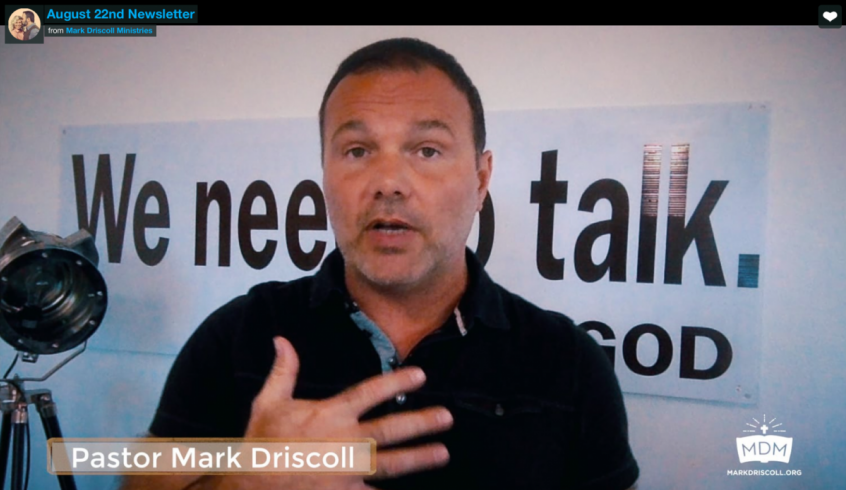
Too soon, anyone? The extraordinary return to public prominence of 'Pastor' Mark Driscoll, who was this week announced as the latest recruit to faith-based mega-blog Patheos, will surprise few people. There's no doubt that Driscoll is a writer, speaker (and some might add, performer) who craves an audience, and that he was always going to make a comeback after his much-publicised exit from the Christian subculture's version of Public Life. Even by his rather tasteless standards however, the speed of it is unsettling.
In fact, Driscoll's 'rehabilitation' has felt choreographed to a cynical extent. He resigned from his position as senior pastor of Mars Hill, the Seattle megachurch that he built somewhat in his own image, back in October 2014. Over the weeks and months that followed, Driscoll said that he sought 'wise counsel' from other leaders, and while there was no great official statement of apology, an admission of guilt or a sense of changed direction, he did at least mainly refrain from speaking engagements while the furore around him died down.
Then, almost exactly 18 months later, in an Easter Sunday service that appeared to have no understanding of irony, he was resurrected as pastor of a new church in Arizona. He was back in ministry already, but had decided to keep a moderately low profile as a humble local church leader. All of this smacks of time biding. Now, another 18 months on, and almost three years to the day from his original 'fall' from grace, Driscoll has placed his feet firmly back in the big time with a move to Patheos, a site renowned for giving a platform to some of American Christianity's biggest, brightest and loudest voices.
So if you were wondering how long a beaten man is prepared to stay down, you now have your answer. Three years is the appropriate amount of time for laying low if you've been accused – apparently with great foundation – of bullying, chauvinism, misuse of church funds, homophobia and even book-sale manipulation. Three years of quietly living off those book royalties and rebuilding the fallen empire, turns out to be a fair enough substitute for actual repentance and restoration.
Driscoll, if you remember, did a good job of shrugging off his critics for years before a group of Mars Hill pastors finally gathered the courage to present undeniable evidence of 'disqualifying behaviour' to the church's elders. He'd previously referred to women as 'penis homes', attacked 'effeminate worship leaders' and claimed that he couldn't worship a Jesus that he could beat up. He'd publicly humiliated his wife in a book about their marriage, and he'd paid a marketing company to elevate that book's presence on the New York Times bestsellers' list by persuading the church in turn to buy 11,000 copies.
Quite what it is that continues to make this man a hero to any follower of Jesus is beyond comprehension. Yes, he's a decent orator and able to string together a few sentences of helpful Bible exposition and life application, but America, like Patheos, is full of Christian 'leaders' looking to occupy that same space. Yet Driscoll remains intriguing – and even inspiring – to so many. His personal Twitter account – the one that appears to block all of his online critics, or anyone who uses the #notodriscoll hashtag – has more than half a million followers. His Resurgence brand has continued (with a subtle name change) over the last three years to give platform to his ideas and retains a loyal following. The painful truth is that Mark Driscoll is back not only because of his unquenchable thirst for the spotlight, but because the spotlight wants him back.
Of course we all love a redemption narrative, but Driscoll's return isn't a story of a man who has redeemed himself against his past shortcomings, but of a skilful manipulator clawing his way back into the mainstream. Those that now read his blogs, visit his websites, watch his videos, listen to his sermons and attempt to recast him as a changed man are not demonstrating the Christian virtue of forgiveness, but enabling an impressively well-planned return to Church fame and fortune. It's a path the American church has trodden a few times before, with the stories of several prominent televangelists, all of whom were once lost and now make great money from having been found.
There has been criticism, and there will be more, but my hunch is that Driscoll and his team are well prepared for it. Even if Patheos now reverse their decision to host the man, he'll soon find another way of clambering back on to the platform; it might just take him another 18 months to get there. Meanwhile, Driscoll's many victims look on with disgust and resignation. All any of us can choose to do is to swallow the hype, or to continue to speak out against the man, even if that does end up getting us blocked on Twitter.
Martin Saunders is a Contributing Editor for Christian Today and the Deputy CEO of Youthscape. Follow him on Twitter @martinsaunders.













